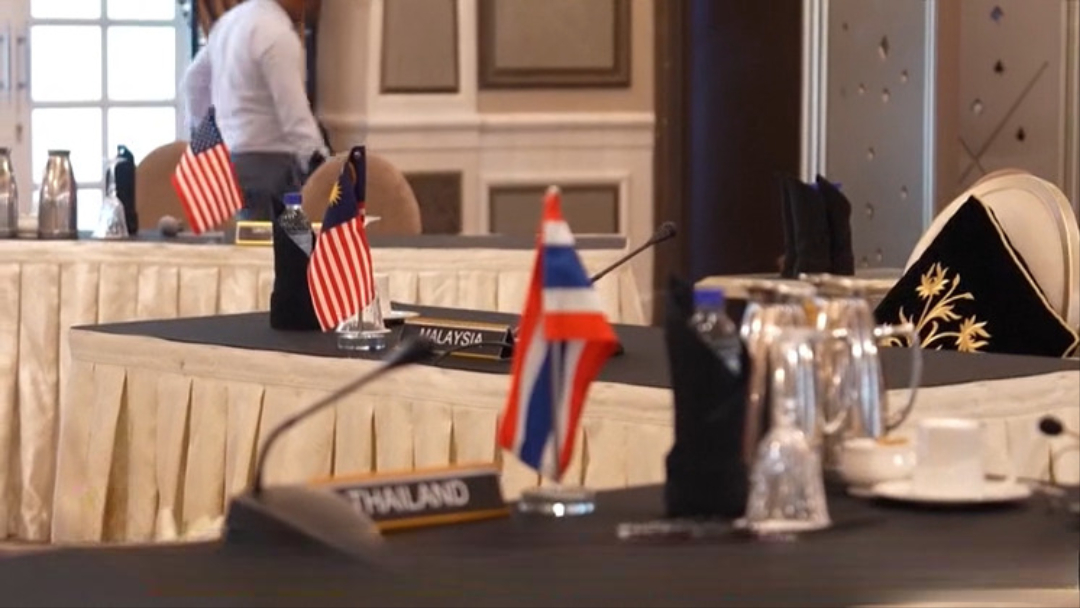This week, the world witnessed a series of significant events that highlighted both the challenges and the hopeful horizons of our global community. From the Middle East Peace Conference in New York to the backlash against Donald Trump's trade agreement with the EU, the deepening food crisis in Africa, and Florida's potential weather record, these developments underscored the interconnectedness of our world and the need for collective action.
Global Challenges and Hopeful Horizons: A Week of International Developments


Middle East Peace Conference
The grand hall of the United Nations headquarters in New York was bustling with activity as diplomats, foreign ministers, and world leaders gathered for the much-anticipated Middle East Peace Conference. The air was thick with a sense of urgency and hope, as the conference aimed to build momentum towards a two-state solution for the long-standing Israeli-Palestinian conflict.
Originally scheduled for June, the conference had been delayed due to various political complexities. However, it was re-energized by a significant announcement from French President Emmanuel Macron, who declared France's recognition of Palestine as a sovereign state. This bold move had sent ripples through the international community, reigniting discussions and bringing a renewed sense of purpose to the conference.
Foreign ministers from 50 countries were in attendance, each bringing their unique perspectives and interests to the table. The goal was to discuss the parameters and timeframe for a two-state solution, as well as other critical aspects that would pave the way for lasting peace in the region.
As the conference commenced, UN Secretary-General Antonio Guterres took the stage to deliver the opening remarks. "Ladies and gentlemen, we stand at a pivotal moment in history. The recognition of Palestine by France is a testament to the growing international consensus on the need for a two-state solution. Today, we must seize this momentum and work towards a future where Israelis and Palestinians can live side by side in peace and security."
The first session of the conference focused on the parameters of a two-state solution. Representatives from Israel and Palestine presented their visions for a future state, highlighting the need for secure borders, mutual recognition, and the resolution of key issues such as settlements, refugees, and Jerusalem's status.
Israeli Foreign Minister, Yair Lapid, emphasized the importance of security guarantees and the need for a demilitarized Palestinian state. "Israel is committed to peace, but we must ensure the safety and security of our citizens. A two-state solution must address our legitimate security concerns and provide a clear path towards coexistence."
Palestinian Foreign Minister, Riyad al-Maliki, echoed the sentiment but stressed the need for an end to the occupation and the establishment of a viable, contiguous Palestinian state. "We seek a future where our people can live in dignity and freedom. The international community must support our right to self-determination and help us achieve a just and lasting peace."
The discussions were intense and often contentious, reflecting the deep-seated mistrust and historical grievances that have plagued the region for decades. However, there was a palpable sense of determination among the participants to find common ground and move forward.
As the conference progressed, breakout sessions were held to address specific issues such as water rights, economic cooperation, and security arrangements. Experts and negotiators worked tirelessly to draft proposals and frameworks that could serve as the basis for future negotiations.
One of the most significant developments came on the second day of the conference when a joint statement was issued by the European Union, the United States, and several Arab states, reaffirming their commitment to a two-state solution and pledging to support the peace process. The statement also called for an end to unilateral actions that could undermine the prospects for peace, such as settlement expansion and incitement to violence.
The conference also saw the participation of civil society organizations and representatives from both Israeli and Palestinian communities. Their voices added a crucial dimension to the discussions, highlighting the human impact of the conflict and the urgent need for a resolution.
As the conference drew to a close, there was a sense of cautious optimism among the participants. While significant challenges remained, the renewed international focus and the commitment of key stakeholders provided a glimmer of hope for a brighter future.
In his closing remarks, Secretary-General Guterres emphasized the need for sustained effort and political will. "The road ahead will not be easy, but we must remain steadfast in our pursuit of peace. The Middle East Peace Conference has shown that there is a genuine desire for change and a willingness to work together. Let us build on this momentum and continue our efforts to achieve a just and lasting peace for all."
Donald Trump's Trade Agreement with the EU
Meanwhile, across the Atlantic, former US President Donald Trump's trade agreement with the European Union was facing a backlash. The agreement, which aimed to reduce tariffs and barriers to trade between the US and the EU, had been hailed as a significant achievement during Trump's presidency. However, recent developments had cast a shadow over its future.
European stock markets took a dip in response to the growing uncertainty surrounding the trade agreement. Investors were concerned about the potential economic impact of a breakdown in negotiations and the possibility of renewed trade tensions between the US and the EU.
The backlash was fueled by a series of controversial statements made by Trump, who had criticized the EU for its trade practices and threatened to impose additional tariffs on European goods. These statements had strained relations between the two sides and raised doubts about the viability of the agreement.
European leaders, including German Chancellor Olaf Scholz and French President Emmanuel Macron, had expressed their concerns about the trade agreement and called for a more balanced and fair approach to trade negotiations. They emphasized the need for mutual respect and cooperation, rather than confrontation and unilateral actions.
The situation was further complicated by the ongoing economic challenges posed by the COVID-19 pandemic. Both the US and the EU were grappling with the economic fallout from the crisis, and there were fears that a trade war could exacerbate the situation and hinder the recovery efforts.
As the backlash continued to grow, there were calls for a reassessment of the trade agreement and a more inclusive and transparent negotiation process. Experts and analysts warned that the current approach was unsustainable and that a more collaborative and cooperative strategy was needed to address the complex trade issues between the US and the EU.
Deepening Food Crisis in Africa
In Africa, a new report by the United Nations warned of a deepening food crisis, with over 300 million people going hungry. The report highlighted the devastating impact of conflict, climate change, and economic instability on food security in the region.
The situation was particularly dire in countries such as South Sudan, Somalia, and Nigeria, where ongoing conflicts and displacement had disrupted agricultural activities and limited access to food. The report also pointed to the adverse effects of climate change, including droughts, floods, and erratic rainfall patterns, which had further exacerbated the food crisis.
The UN called for urgent action to address the root causes of the food crisis and provide humanitarian assistance to those in need. The report emphasized the need for a comprehensive and coordinated response, involving governments, international organizations, and civil society.
Efforts were underway to mobilize resources and support for affected communities, but the scale of the crisis required a sustained and concerted effort. The UN urged the international community to step up its assistance and work together to find lasting solutions to the food crisis in Africa.
Florida Weather Record
In Florida, residents were bracing for a potential weather record as temperatures soared to unprecedented levels. Tampa, a city known for its warm climate, had never reached 100°F (37.8°C) before, but meteorologists predicted that it might reach that temperature this year.
The heatwave was part of a broader pattern of extreme weather events that had been affecting the region, including hurricanes, floods, and wildfires. Scientists warned that climate change was contributing to the increasing frequency and intensity of these events, and called for urgent action to address the underlying causes.
As Floridians prepared for the scorching temperatures, there were concerns about the impact on public health, infrastructure, and the environment. Authorities issued heat advisories and urged residents to take precautions to stay safe and cool.
The potential weather record served as a stark reminder of the urgent need to address climate change and its far-reaching consequences. It highlighted the importance of collective action and the need for sustainable and resilient solutions to protect communities and ecosystems from the impacts of a changing climate.
In conclusion, the Middle East Peace Conference in New York represented a significant step towards achieving a two-state solution for the Israeli-Palestinian conflict. The conference brought together key stakeholders and reaffirmed the international community's commitment to peace. However, challenges remained, and sustained effort and political will were needed to overcome the obstacles and achieve a just and lasting peace.
Meanwhile, the backlash against Donald Trump's trade agreement with the EU underscored the complexities and sensitivities of international trade negotiations. The situation called for a more balanced and cooperative approach to address the economic challenges and foster mutual respect and understanding.
The deepening food crisis in Africa highlighted the urgent need for a comprehensive and coordinated response to address the root causes of food insecurity and provide humanitarian assistance to those in need. The international community was called upon to step up its efforts and work together to find lasting solutions to the crisis.
Finally, the potential weather record in Florida served as a reminder of the urgent need to address climate change and its far-reaching consequences. It underscored the importance of collective action and sustainable solutions to protect communities and ecosystems from the impacts of a changing climate

 বাংলা
বাংলা  Spanish
Spanish  Arabic
Arabic  French
French  Chinese
Chinese 







